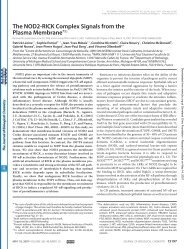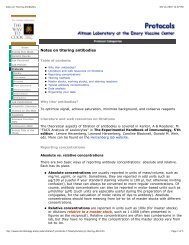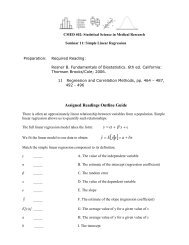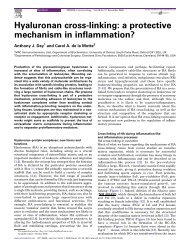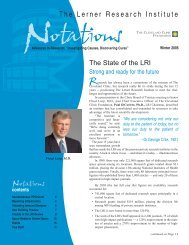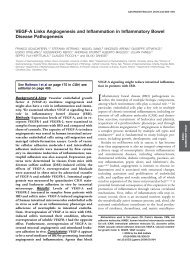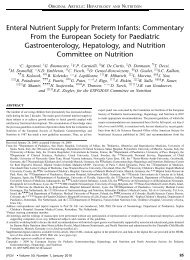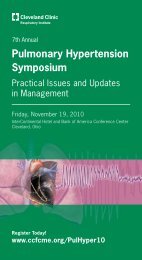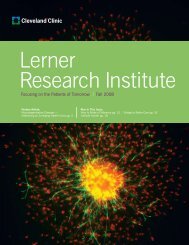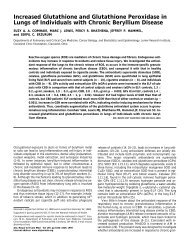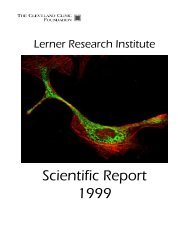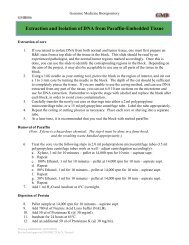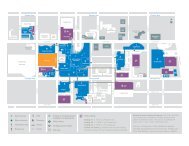Scientific Report 2003-2004 - Cleveland Clinic Lerner Research ...
Scientific Report 2003-2004 - Cleveland Clinic Lerner Research ...
Scientific Report 2003-2004 - Cleveland Clinic Lerner Research ...
- No tags were found...
You also want an ePaper? Increase the reach of your titles
YUMPU automatically turns print PDFs into web optimized ePapers that Google loves.
THE ARONICALABORATORYSENIOR RESEARCH TECHNOLOGISTShadi SwaidaniCOLLABORATORSMark R. Boothby, M.D., Ph.D. 1R. Stokes Peebles, M.D. 21Dept. of Microbiology andImmunology, Vanderbilt Univ.,Nashville, TN2Dept. of Allergy, Pulmonary andCritical Care Med., VanderbiltUniv., Nashville, TNAn individual’s susceptibility to allergy, asthmaand autoimmune disease is influenced byresponses of the white blood cells toactivation. In particular, the regulation of the subsetsof T lymphocytes called Th1 and Th2 cells isimportant in these processes.Type 1 T-cell effectors activatemacrophages and are important inthe development of delayed-typehypersensitivity (DTH), in partthrough the production of IFN-γand TGF-β. In contrast, type 2effector cells serve as mediatorsof the humoral response andinduce IgE- and eosinophilmediatedreactions through theproduction of IL-4, IL-5 and IL-13. Type 2 responses are thoughtto be important in limiting orinhibiting type 1 inflammatoryresponses and may play a role insuppressing autoimmune diseases.A wealth of data from mice andhumans has led to the recognitionof T cells and cytokines characteristicof type 2 T cells as crucialpathogenic components in allergicdiseases. So many known featuresof allergic processes can beproduced by Th2-dependentcytokines that asthma has come tobe viewed as a Th2 disease. In contrast to this simplemodel, recent data suggest a role for Th1 cells as well.Transcription Factors and Regulation of Type 1and Type 2 T-Cell ResponsesWe have shown that inhibition of NF-κ/Reltargeted specifically to the T lineage selectivelyAronica, M.A., Mora, A.L., Mitchell, D.B., Finn, P.W., Johnson, J.E., Sheller, J.R., andM.R. Boothby (1999) Preferential role for NF-kB/Rel signaling in the type 1 but nottype 2 T cell-dependent immune response in vivo. J. Immunol. 163:5116-5124.Aronica, M.A., Goenka, S., and M. Boothby (2000) IL-4-dependent induction of BCL-2and BCL-X(L)IN activated T lymphocytes through a STAT6- and pi 3-kinase-independentpathway. Cytokine 12:578-587.Boothby, M., Mora, A.L., Aronica, M.A., Youn, J., Sheller, J.R., Goenka, S., and L.Stephenson (2001) IL-4 signaling, gene transcription regulation, and the control ofeffector T cells. Immunol. Res. 23:179-191.Boothby, M., and M.A. Aronica (2002) Transcription regulation, allergic responses, andasthma. Allergy Immunol. Clin. N. Am. (In press),Corn, R.A., Aronica, M.A., Zhang, F., et al. (<strong>2003</strong>) T cell-intrinsic requirement for NFkBinduction in postdifferentiation IFN-g production and clonal expansion in a Th1response. J. Immunol. 171:1816-1824.The Department of ImmunologyRole of T Lymphocytes and T-Cell Memory inthe Development of Airway Inflammationand AsthmaMark A. Aronica, M.D.impairs development of Th1 responses only, withnormal development of Th2 responses, as measuredby cytokine production and antigen-specific IgEproduction. Despite evidence of an adequate Th2response, there is only a modest influx of eosinophilsin a model of allergic pulmonaryinflammation (asthma), providingadditional support that Th1 cells needto collaborate with Th2 cells in thedevelopment of asthma. Usingtransgenic and knockout mice withimpaired Th1 function, we hope tobetter delineate the role of Th1 cellsin the development of asthma.Susceptibility to Asthma: A Linkwith the Development ofAntigen-Experienced/Memory-Phenotype CellsDespite the known importanceof immunologic memory inprotection from viral and bacterialpathogens, little is known about therole of memory in allergy. Therefore,we have developed a model toinvestigate whether memory T-cellresponses are important for thedevelopment of allergic diseases.To investigate the role ofmemory T cells in the developmentof allergic pulmonary inflammationand airway hyperresponsiveness (AHR), we havedeveloped a novel mouse model. In this system, T-cell receptor (TCR)-transgenic CD4 + effector cells aregenerated in vitro and then transferred into naïverecipients. After waiting until the effectors have beendemonstrated to resume quiescence and haveacquired memory status, recipient mice are exposedto aeroallergen. Using this system, we have shownthat antigen-specific memory Th2 cells are sufficientto lead to the development of AHR and allergicpulmonary inflammation. Interestingly, if Th1 cellsare transferred and resume quiescence, they are notrecruited to the lung upon antigen exposure. Usingthis model, we hope to better understand mechanismsregulating the trafficking of Th1 and Th2 memorycells.88



